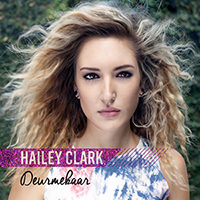
Hailey Clark, musician and
third-year BA Drama and
Theatre Arts student at the
University of the Free State.
Photo: Sonelle van Wyk.
Music was always something this singing sensation wanted to do from a very early age.
Sonet du Plessis, more famously known by her stage name, Hailey Clark, is a third-year BA Drama and Theatre Arts student at the University of the Free State (UFS). Her electronic pop debut album, titled Deurmekaar, was finally launched after a year of hard work and sacrifice.
Success in English and Afrikaans
Hailey, whose album features Afrikaans and English songs, says her music is influenced and inspired by a variety of local sounds and artists. “Dirk van der Westhuizen and Refentse – a new and upcoming artist – are two of the locals I look up to,” she says.
Reaching success at such a young age is the result of setting goals and achieving them. “Success is when you grow as a person and an artist in your music. You need to enjoy every moment of what you do and share it with other people,” Hailey says.
Future music producer and actress
With a bright future ahead of her, Hailey wants to become a full-time musician, but also wants to focus on acting, especially in films. “I want to perform as much as possible and hopefully become a music producer. I also have plans to do some acting as well.”
For all those who dream of becoming a musician, it’s hard work, Hailey says. “You have to know it is something you want to do and you have to commit to it. If it is what you want, keep focused and surround yourself with positive and encouraging people.”